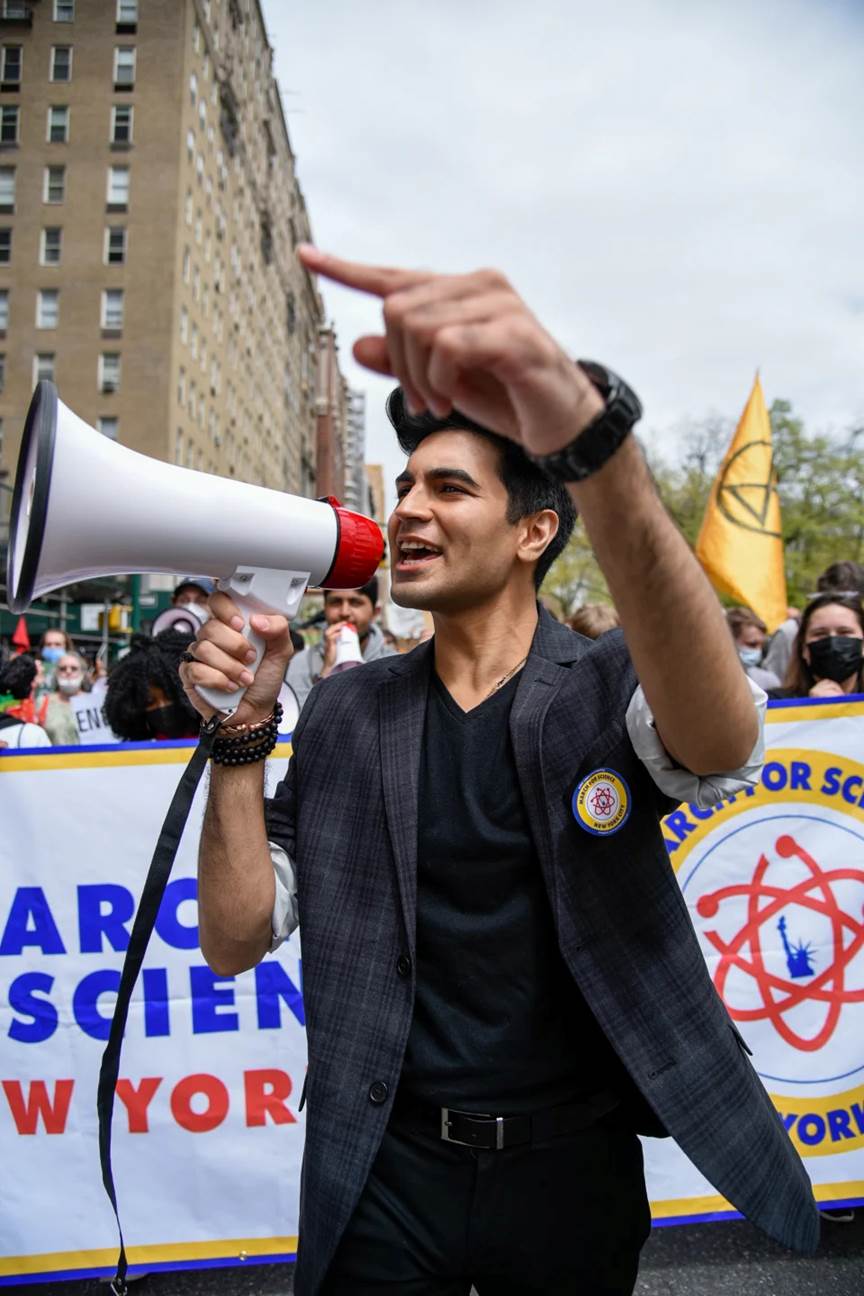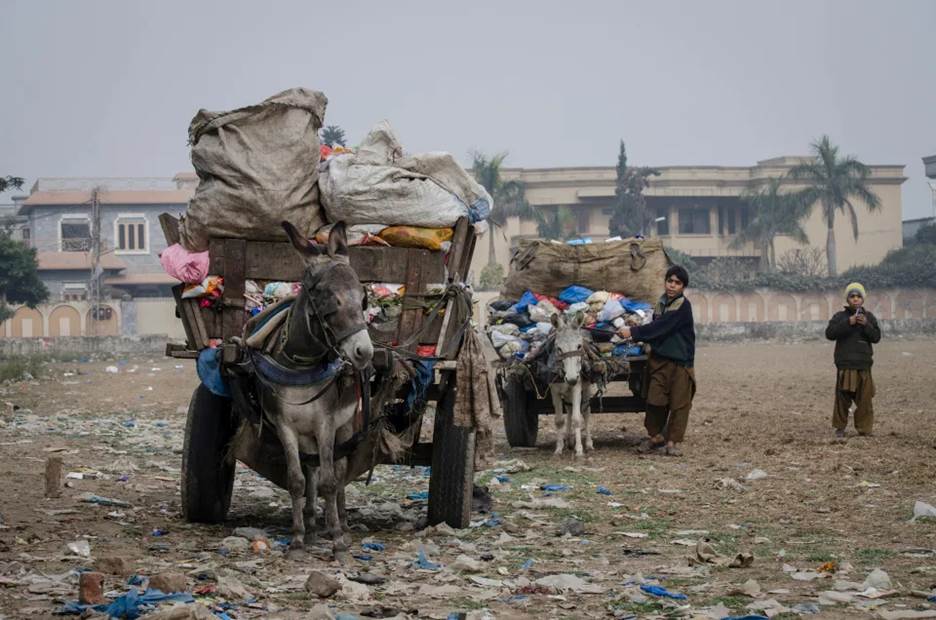
Saad Amer attends March for Science NYC in 2022 -
Photo Pamela Elizarrarás Acitores
Worlds Collide: The Relationship Between Muslim Communities and the Climate Crisis
By Saad Amer
(Last year, from June until October, Pakistan endured a devastating flood that the country is still recovering from, impacting the lives of more than 10 million people and leading to a reported death toll of 1,486, including more than 500 children. These numbers represent just one predominantly Muslim territory profoundly affected by environmental disasters. The rage and frustration generated by this particular catastrophe were deeply felt by many fighting for climate justice globally—and among those voices is 28-year-old Pakistani-American climate activist Saad Amer.
Amer is a 2016 Harvard Graduate and a first-generation immigrant who has devoted his life to protecting the planet as we know it. As a believer in political policymaking being the vehicle for actionable change, Amer co-founded Plus1Vote in 2018, a platform encouraging voter engagement and registration among diverse youth communities. A consultant to the United Nations and an expert reviewer of IPCC, in 2022, he founded Justice Environment , a social impact consultancy supporting businesses and organizations in sustainable strategy and environmental justice.
As a Muslim person of color engaged in the fight for climate justice, the work is deeply personal and often taxing. Intersectionality isn’t an option when it comes to environmental justice—it’s a requirement. No one is exempt from the climate crisis and the warning of disaster it presents, meaning this fight must be a collective effort. This year, as both Earth Month and Ramadan are celebrated, the Muslim holiday of Eid al-Fitr overlaps with Earth Day, making for a symbolic moment that also holds a deeper significance.
Here, Amer walks Vogue through the importance of honoring this rare calendar overlap in 2023.)
It’s easy to overlook the connection between different communities and how they're disproportionately impacted by climate change. My parents are immigrants from Pakistan: I grew up Muslim, going to the mosque, and always getting together for holidays like Eid to celebrate. I was given a culture and a language with all sorts of depth and history far beyond my own existence, and when practicing my own climate activism I think so much about the long history and legacy of these different communities all across the Muslim world, and how there is so much overlap between all those different cultures and identities.
I had a really big wake-up moment when I was in college. During my sophomore year at Harvard, where I was studying biology at the time, I went on a trip to Pakistan, which was really my first time going there as an adult. I remember walking along the street with my camera and I came across this waste site. It was a very informal dump in the middle of a park where people were playing cricket, and right along a waterway, and there was garbage as far as the eyes could see. Barrel cows were eating the trash. I literally saw a dog pass away while I was there, and a donkey-driven cart carrying garbage to the site led by two children during school hours.
While we often talk about this notion of intersectionality within climate change, in that moment, it hit me in such a powerful way, partly because this is my community. At the same time, I understood that this wasn't unique to Pakistan. This isn't just a developing country issue, or a global south issue. This is the reality even in the United States: we do a better job of hiding it, but our waste ends up in virtually the same reality.
I believe that Islam is very much rooted in preserving our environment. Within the religion, we're taught to be stewards of the earth, and as in any religion, we are held accountable for our actions. If we are actively destroying our world and making it worse for future generations, how can we see that as morally righteous? We can't. One of the central pillars of Islam, and throughout this time of Ramadan in particular, is a notion called zakat, which is all about charity and giving back. During Ramadan, all of our good deeds are amplified. So, I believe that we should take the opportunity of this focus to also think about and care for those people who are disproportionately impacted by climate change, because so many of those people are in the Muslim world.
Temperatures are increasing. We're already at about 1.2 degrees Celsius above pre-industrial times. In a warming scenario where we get to two degrees, there will be around 200 million climate refugees globally. We can hardly handle a few thousand from Syria. We can hardly handle a couple of people coming across the border from Mexico without intense hate and bigotry. There have been many scientific papers that have highlighted the reality that the refugee crisis happened in part because of climate change, with global warming increasing temperatures making these arid regions even more so difficult to farm in. A lack of food creates desperation, which creates migration, and when you have that coupled with other tensions, you then get more and you then get people who are forced to evacuate, and you get a refugee crisis. All across Europe, we've seen hatred towards these people as they've been trying to integrate into these countries, despite the reality that so much of the climate crisis is caused by Europe and other nations of the global north.
I believe that in the future we will see Islamophobia grow as the impact of climate change grows. So many Muslim communities are disproportionately impacted by the climate crisis. During the floods in Pakistan last year, a third of the country was submerged underwater. Even now, months later, they've been unable to fully recover from the reality of those floods. So many people have died, and entire villages are gone. After the floods happened, I spoke to my grandmother on the phone and it was the first time I ever really heard sadness and desperation in her. She's a matriarch and a strong figure, and it was really crushing to hear how my work wasn't going fast enough to protect the people in my own community.

Photo courtesy of Saad Amer
We're at the point where we need radical transformative change, because people are suffering right now. On top of Pakistan, there has been the energy crisis in Bangladesh which has plunged the country into economic turmoil, or the hundred-plus-degree days in the UAE, in Iran, in Kuwait, in Oman. We're not meant to be in this type of climate. The official numbers don't even begin to describe the actual level of suffering that a lot of these places have experienced. I think that when talking about the intersection of climate change and the Muslim world, we don't usually look at it in terms of unifying Muslim communities. I'm not going to be naïve and pretend there aren’t other cultural or diplomatic issues between these countries, but at this moment when Eid and Earth Day coincide, it’s important to do everything we can to heal any rifts.
We need to envision a new future and we need visionaries to help us architect what that looks like. I think fashion, art, and culture are all incredible spaces to have that dialogue. I also think a lot of communities already exist, whether they be activist communities or businesses or faith-based communities where people can come together to bond over their mutual values and create something bigger that goes on beyond themselves. This is why I always focus on voting, because within a democracy, we are all of these individuals. We are all these citizens—but when we collectively come together, we have this major power that can fundamentally shift our systems and elect better representatives who can change things in a systematic way.
So, with Eid and Earth Day overlapping this year, I think it’s a reminder that we are all part of this system. As our planet rotates and as the stars are fixed in our sky, we need to understand our place in this universe. We all have a role to play. Whether you are a businessperson or an artist, all of our jobs have something to do with the planet, and there’s always something that we can do to shift our own behaviors and the systems around—and make sure we’re a part of taking it in the right direction. Originally appeared on Vogue

